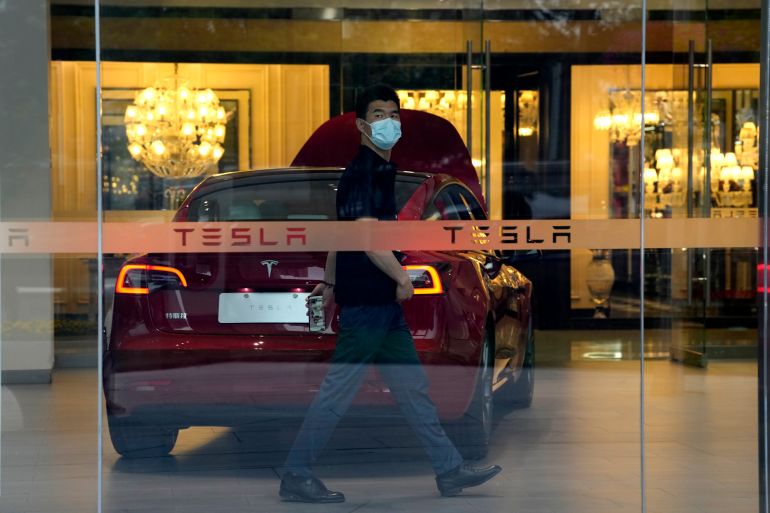Tesla boss Elon Musk kicks off high-stakes China trip
China’s foreign ministry quoted Musk as saying he wanted to expand business in China and opposed a decoupling.

Tesla Chief Executive Elon Musk is on a high-stakes visit to China, starting with a meeting with the country’s foreign minister in Beijing, marking his return to the electric car maker’s largest production hub after three years.
The trip, which started on Tuesday, is the latest return by a top United States CEO to China since the country reopened its borders and reversed its zero-COVID policy in December. Apple’s Tim Cook visited in March, while JP Morgan’s Jamie Dimon and Starbucks’s Laxman Narasimhan are also in China this week.
Keep reading
list of 4 itemsTheranos founder Elizabeth Holmes reports to prison
Turkey’s opposition faces difficult road ahead after another loss
US debt limit deal: How we got here
Musk met Chinese Foreign Minister Qin Gang hours after landing in Beijing.
Qin told Musk China was committed to improving the business environment for investors, including Tesla, and used an elaborate driving metaphor to describe China-US relations, according to a statement from his ministry.
“We must step on the brake in time, avoid dangerous driving and be skilful at using the accelerator to promote mutually beneficial cooperation,” Qin said.
The foreign ministry quoted Musk as saying he was willing to expand business in China and opposed a decoupling of the US and China economies, adding he described the world’s two largest economies as “conjoined twins”.
US-Chinese relations are especially tense after Washington shot down a Chinese balloon believed to be gathering intelligence and warned Beijing against supplying arms to Russia for its war against Ukraine. Issues with Taiwan, trade and human rights concerns also persist. China has rejected a request for its defence minister to meet the US defence secretary when both are in Singapore this weekend.
“We need to keep the steering wheel in the right direction of mutual respect, peaceful coexistence and win-win cooperation,” Qin told Musk, according to a ministry statement.
The two sides should “avoid ‘dangerous driving’”, Qin said. He gave no details of steps to improve relations.
Musk’s visit comes at a time when the ruling Communist Party is trying to revive investor interest in China’s slowing economy. Foreign companies are uneasy following raids on consulting firms and given the strained Chinese relations with Washington.
Tesla did not respond to a request for comment on Musk’s trip, his itinerary or his meeting with Qin. China is Tesla’s second-largest market after the United States.
Musk, who also owns Twitter, was quiet on the platform after arriving in China, where Twitter is banned but accessible to some users through a virtual private network. He had not posted on his official Weibo account either.
He is expected to meet other senior Chinese officials and visit Tesla’s Shanghai plant during his trip, Reuters reported on Monday, though it was not clear who exactly he would meet or what issues they would discuss.
A source with knowledge of the matter said on Tuesday that a meeting with Zeng Yuqun, chairman of CATL, the Chinese battery giant and a key Tesla supplier, was also planned in Beijing. CATL did not respond to a request for comment.
In a 2019 trip to China, Musk met with then-Premier Li Keqiang. A year later, he created a buzz on Chinese social media for dancing onstage to celebrate the opening of Tesla’s Shanghai factory.
Increasing competition
Tesla faces intensifying competition from Chinese-made electric vehicles and some uncertainty about expansion plans for the Shanghai plant, its largest production hub.
Tesla investors have questioned whether and by how much the electric car maker will increase output in Shanghai.
Investment firm Wedbush analyst Daniel Ives said he expected Tesla to “aggressively focus on building out its China footprint”.
Despite increasing competition, China’s market for electric vehicles (EVs), the world’s largest, has become “the golden goose EV market”, he said, a reference to a source of continued profit.
He called Tesla’s Shanghai plant “the heart and lungs” of the company’s global production in a note for investors.
Another issue for investors is whether China regulators will clear the release of Tesla’s advanced driver assistance features available in the US as part of the “Full Self-Driving” software it sells for $15,000 per vehicle.
Musk’s space company, SpaceX, and the military applications of its Starlink satellite network have also been watched with interest and concern by Chinese researchers since Russia’s invasion of Ukraine.
State-owned Chinese companies are rushing to follow Starlink by launching their own low-Earth orbit communications satellites. Chinese military researchers have studied Starlink as a potentially threatening technology, according to research reviewed by Reuters.